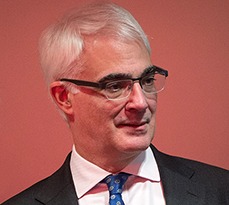
Financial Times, CC BY 2.0 creativecommons.org/licenses/by/2.0, via Wikimedia Commons
The United Kingdom faces a 30-year project to level up society by revitalising left-behind areas in ways that go far beyond new transport links, the former Chancellor of the Exchequer, Alistair Darling, told a speaker series co-ordinated by Pembroke College and Cambridge Judge Business School.
“That project is not about just building roads and railways – a road into an area that’s lost its shops, that’s lost its core industries and so on, that isn’t going to sort things. It’s about building up the critical mass you need in order to make towns and cities thrive again; it means good quality housing, education, making sure that these places are good places to live.
“This is, I would say, a 30-year project – not 10 years, it’s 30 years – and the government hasn’t yet to my mind shown what it’s proposing to do to tackle that problem,” Alistair Darling told The Pembroke Speaker Series @ Cambridge Judge in International Finance. “In my view this is a project that is necessary, not just economically but politically too.”
The speaker series is part of a wider collaboration between Pembroke College and Cambridge Judge which includes the annual appointment of a prestigious Pembroke Visiting Professorship of International Finance at the business school and support for Pembroke PhD studentships in the field of international finance.
Alistair Darling served as Chancellor of the Exchequer in the Labour Government from 2007 to 2010, as a Member of Parliament from 1987 until 2015, and has been a member of the House of Lords in the period since then until his recent retirement in July 2020.
Alistair Darling’s topic in the webinar was “The economic and political consequences of COVID-19”. He was introduced by Christoph Loch, Dean of Cambridge Judge Business School, and then interviewed by Lord Chris Smith, Master of Pembroke College. Following the interview, a question-and-answer session was moderated by Dr Simon Taylor, Faculty (Professor level) in Management Practice (Finance) at Cambridge Judge.
Here are some edited excerpts from the interview exchange:
Lord Smith: This wretched pandemic that we are living through, it has caused huge distress, far too much illness and death, but it has also destroyed much economic activity. Do you think the fiscal response from the Treasury of the UK has been appropriate to the crisis?
Alistair Darling: Generally the measures taken in response to this pandemic have been the right ones. The difference between now and the financial crisis was that our priority the next day after stabilising the banking system in 2008 was to get the economy going again, but this time the government quite rightly was suppressing the economy by keeping people home, and now only starting to get the economy going again.
Lord Smith: The pandemic has meant massive spending, so how do you see the huge debt that is accumulated being handled?
Alistair Darling: Accumulated debt is something we will have to deal with over decades. The speed depends on the economic recovery and what else might come along. You’ve actually got to err on the side of being wary on this as there could be another pandemic, recurrence of the existing pandemic, cyberattacks and so on. It would be quite foolish to try to tackle that debt problem immediately because you will suppress economic activity even more.
Lord Smith: If you were still Chancellor of the Exchequer, how would you over the next ten years set about addressing inequality?
Alistair Darling: First, make sure the NHS has enough resilience in it – you can’t fund the NHS on a just-in-time basis. We also need to look at underlying problems: in this country we have far too many people who have absolutely no economic resilience, so that means addressing wage levels, and also housing and inequality of education. Before the virus there was a lot of talk about levelling up.
That project is not about just building roads and railways – a road into an area that’s lost its shops, that’s lost its core industries and so on, that isn’t going to sort things. It’s about building up the critical mass you need in order to make towns and cities thrive again; it means good quality housing, education, making sure that these places are good places to live. This is, I would say, a 30-year project – that’s not ten years, it’s 30 years – and the government hasn’t yet to my mind shown what it’s proposing to do to tackle that problem.
Lord Smith: There are substantial differences between the financial crisis of 2008 and the COVID crisis, but are there lessons you learned in the financial crisis that we should be applying now?
Alistair Darling: In the financial crisis, the government put in a huge amount of money to stabilise the banking system and we did it overnight. There are two lessons: first, do more than people expect and do it quickly, and second is the need for international cooperation.
Lord Smith: The UK faces not only responding to the pandemic, but it also has Brexit to contend with. How do you see those twin challenges playing out?
Alistair Darling: What I hope is that over time the UK enters into a more sensible relationship with its next-door neighbour and biggest trading bloc, the EU. All sensible external observers naturally say Covid will provide a hit and there will also be a hit as a consequence from Brexit, and so far the benefits of Brexit have failed to reveal themselves, but who knows.
Lord Smith: How have recent events influenced the independence debate in Scotland?
Alistair Darling: Scotland is split down the middle, with roughly 40% for independence, 40% for staying in the United Kingdom, and 20% undecided. There is no doubt the dispute (between First Minister Nicola Sturgeon and predecessor Alex Salmond) is beginning to cut through into public opinion (against independence). But you’d be brave to forecast even the result of the Holyrood parliament elections in May, much less whether there will be an independence referendum and if so, what the result would be. There are too many moving parts.
Lord Smith: Talking to students or recent grads listening to this webinar, do you have suggestions on what they should try to make of the future?
Alistair Darling: Just have belief in your own abilities, and the confidence in yourself, and look after the man or woman next to you. Take a broad world view, you’ll do okay.


